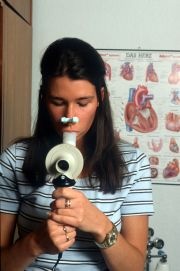Pulmonary hypertension: New drugs improve quality of life
Today help is often available for those suffering from high blood pressure in the pulmonary circulation (pulmonary arterial hypertension/PAH). New drugs — so-called endothelin receptor antagonists — make it possible to alleviate the symptoms, improving patients' physical strength and quality of life.

„High lung pressure is characterised by a gradual, insidious onset of symptoms, which are non-specific to start with. Which is why PAH is often not recognized straight away,” explains David Pittrow, associate professor at the University of Dresden. Patients experience weakness and fatigue, as well as breathing difficulties after physical activity. Further symptoms such as fainting and swelling in the legs can point to PAH. Not only adults suffer from the condition, but also children with congenital heart disease. As with many chronic diseases, there is currently no permanent cure, but many symptoms can be treated effectively. Besides lowering blood pressure, the most important goal of treatment is to improve the supply of oxygen, thereby increasing physical strength.
The common denominator in all forms of PAH is a narrowing of the blood vessels in the lung. Endothelin-1, a hormone released by the endothelium, the inner lining of the arteries, is considered to be an important factor in the disease. It is, says Pittrow, the most potent vasoconstrictor, i.e. constrictor of the blood vessels, in the human body. Substances such as bosentan, sitaxentan and ambrisentan have the opposite effect. They block the action of endothelin-1 by binding to the receptor sites – they are endothelin receptor antagonists.
„Because there are other drugs available for treating PAH besides the three endothelin receptor antagonists, doctors now have a better chance of effectively treating this disease,” says Pittrow, adding that it is difficult to predict which drug, or which combination of drugs, will work best for the individual patient. That is why experts from Hanover and Dresden set up the CompERA-XL patient register in 2007.
Image: AOK-Mediendienst
07.05.2009



